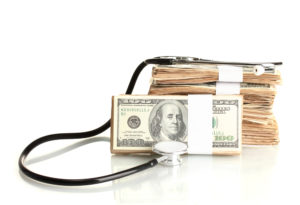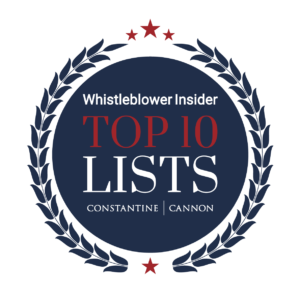Top Ten Healthcare Fraud Recoveries of 2020

Consistent with the trend in prior years, the bulk of the Justice Department’s fraud and false claims recoveries in 2019 stemmed from healthcare fraud matters, and with the Biden administration eyeing a bigger role for the federal government in our healthcare system, this trend is likely to accelerate. Most of the funds recovered arose from cases originated by whistleblowers under the qui tam provisions of the False Claims Act.
The majority of the recoveries on this list involve allegations of violations of the anti-kickback statute, a federal law that prohibits medical providers from paying or receiving kickbacks, remuneration, or anything of value in exchange for referrals of patients who will receive treatment paid for by government healthcare programs such as Medicare and Medicaid. Here are the top ten healthcare recoveries of 2020 by the numbers:
- Purdue – In October, the creator and distributor of oxycontin, the world’s most lucrative opioid, agreed to a blockbuster $8.3 billion settlement resolving a litany of related criminal and civil lawsuits aimed at the company’s marketing and distribution of the drug. The settlement reads like a textbook from a survey course on healthcare fraud, touching on kickbacks, violations of the FDCA, defrauding the DEA, and other issues, all of which contributed mightily to the opioid crisis. In addition to the settlement with the corporation, several of Purdue’s owners, members of the powerful Sackler family, paid $225 million individually. Last year, Purdue also appeared on this list, coming in second place.
- Novartis – In July, the pharmaceutical giant agreed to pay $678 million to resolve a New York case alleging that it paid inflated “speaking fees” and provided other incentives (including lavish meals, deep-sea fishing outings, wine tastings, hibachi tables, and golf trips) to doctors to induce them to prescribe Novartis drugs. The case was brought by a whistleblower, a former Novartis sales representative, who received a whistleblower reward of over $100 million. One of the largest ever. Novartis is no stranger to this list, making an appearance last year, and holding the top spot for 2015.
- Indivior – Also in July, the pharmaceutical manufacturer agreed to a $600 million settlement to resolve criminal and civil allegations associated with the marketing of the opioid-addiction-treatment drug, Suboxone. The company claimed that the drug was safer and less susceptible to abuse than similar drugs. Indivior was also accused of using an internet and phone program, which was purported to be a recovery resource, to connect opioid addicts to doctors that were prescribing Suboxone at suspiciously high rates. This is in addition to the $1.4 billion resolution with Indivior’s former parent, Reckitt Benckiser Group PLC (“RB Group”) which topped last year’s list of healthcare recoveries. Along with the Purdue settlement at number one, this settlement with Indivior shows DOJ’s commitment to battling fraud that has led to the opioid crisis.
- Triwest Healthcare Alliance – Finishing off a solid year, on New Year’s Eve the DOJ announced a $179 million settlement with a VA contractor, resolving allegations that the company improperly retained overpayments in connection with its administration of certain VA health care programs. Specifically, VA allegedly paid TriWest twice for the same services, or paid for services for which TriWest received full or partial reimbursement from other healthcare providers, and TriWest failed to return those overpayments
- Practice Fusion – Back in January, DOJ lived up to its stated 2020 priorities and reached a $145 million settlement resolving allegations regarding the company’s Electronic Health Record (EHR) that it solicited and accepted unlawful kickbacks from pharmaceutical companies and misrepresented the capabilities of its EHR software. The settlement represents the first time that an EHR provider has been criminally charged with a violation of the Anti-Kickback Statute and the second largest False Claims Act settlement involving EHR fraud, behind a 2017 $155 million settlement with eClinicalWorks.
- Universal Health Services – In a record-setting month of healthcare fraud settlements in July, DOJ secured a $117 million settlement with UHS. The settlement resolved 18 separate qui tam lawsuits that all generally alleged that UHS billed federal healthcare programs—including Medicare, Medicaid, TRICARE, the Department of Veteran Affairs, and the Federal Employee Health Benefit programs—for medically unnecessary inpatient behavioral health services, failed to provide adequate or appropriate services, and paid illegal inducements to beneficiaries of those programs. The same day, a UHS subsidiary, Turning Point, agreed to pay $5 million to resolve allegations it provided free or discounted transportation services to induce Medicare and Medicaid beneficiaries to seek its treatment.
- Gilead – In their latest, large action in combatting fraudulent patient assistance programs, Boston-based prosecutors reached a $97 million settlement with Gilead Sciences. They alleged that it paid patients kickbacks aiming to steer them into using Gilead’s hypertension drug, Letairis. Gilead disguised the kickbacks as charitable contributions to a foundation. The government is harmed by this practice because it removes market forces out of a patient’s choice of drug, steering patients to more expensive drugs. If expensive drugs are associated with hefty co-pays, as Medicare intended them to be, patients might opt for cheaper alternatives. The Boston US Attorney’s office has collected nearly a billion dollars pursuing cases with a similar theory against many giants in the industry including Pfizer, United Therapeutics, Amgen, Astellas, Alexion, Actelion, Jazz, and Sanofi-Aventis and is currently pursuing a similar case against Regeneron. Additionally, Pfizer has filed a suit against HHS, seeking a court’s blessing of the practice. This area of law is sure to stay a hot topic in 2021.
- Oklahoma Center for Orthopedic and Multi-Specialty Surgery – The specialty hospital located in Oklahoma City, along with a group of specialists, agreed to pay $72.3 million to resolve kickback allegations relating to improper financial relationships between the hospital and the physician group, allegedly paying kickbacks to capture referrals.
- Visiting Nurse Service of New York – one of the nation’s largest providers of home healthcare services agreed to pay $57 million to resolve allegations that VNSNY failed to provide its patients all the critical nursing and therapy visits and services their doctors prescribed under the patient Plans of Care, and that by failing to provide this care, VNSNY endangered the welfare of tens of thousands of its patients while maximizing the company’s Medicare and Medicaid reimbursement. The whistleblower in this case, a former VNSNY executive, was represented by Constantine Cannon.
- Novartis (separate settlement) – On the same day as DOJ announced the $678 million settlement that came in at number two on this list, prosecutors announced a separate, $51 million dollar settlement with the company. This second settlement resolved allegations that the company misused charity funds to steer patients towards its drugs, similar to the settlement with Gilead that is number seven on this list. This concluded a very bad week for Novartis- this all came on the heels of a $345 million settlement with the SEC and foreign regulators, resolving allegations that Novartis payments to doctors in Greece, Korea, and Vietnam violated the Foreign Corrupt Practices Act.

Annual Whistleblower Insider Top Ten Lists
Every January, Whistleblower Insider looks back at the significant government enforcement actions of the past year. Our Top Ten lists highlight the biggest recoveries and significant enforcement efforts by different government actors in cases of interest to whistleblowers.
Browse Top 10 Lists
READ MORE:
- Anti-Kickback Statute and Stark Law
- Fraud Related to Electronic Health Records
- Healthcare and Pharmaceutical Fraud
- Home Health and Hospice
- Hospital Fraud
- Provider Fraud
- See all of our Top Ten Lists
- I think I have a whistleblower case
- The Constantine Cannon Whistleblower team
Tagged in: Anti-Kickback and Stark, Electronic Health Records, FCA Federal, FCPA, Government Programs Fraud, Healthcare Fraud, Home Health and Hospice, Medicaid, Medicare, Pharma Fraud, Provider Fraud, Top 10,